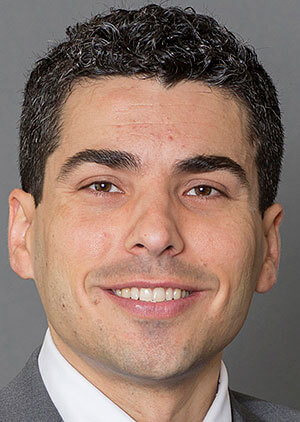February 8, 2017
Science on Tap to focus on use of self-powered, point-of-care diagnostics
 Ramses Martinez
Ramses Martinez
Download image
WEST LAFAYETTE, Ind. - Purdue University industrial engineering professor Ramses Martinez will highlight the growing role of self-powered, point-of-care diagnostics in the delivery of health care at next week's session of Science on Tap.
Martinez's talk, which is free and open to those 21 and older, is at 6 p.m. Feb. 16 on the top floor of Lafayette Brewing Company, 622 Main St., Lafayette. Event sponsors are the School of Industrial Engineering, Weldon School of Biomedical Engineering and College of Engineering.
"We are seeing advances in paper-based electronics and microfluidics, making it possible to fabricate lightweight, low-cost and single-use electrochemical analytical devices that can be directly powered by the user as a portable alternative for point of care diagnostics," Martinez said.
Martinez, who has a joint appointment with the Weldon School of Biomedical Engineering, said paper-based electrochemical devices (PEDs) are attracting attention among other lab-on-a-chip systems to detect and quantify a wide variety of analyses - from proteins and metabolites to nucleic acids and metal ions - because of their portability, simplicity, disposability and low cost.
PEDs fabricated on common filter paper, he said, benefit from the capillary-driven flow through their self-pumping microfluidic channels to enhance the mass transport on the surface of the electrodes and to increase their current response. As a result, PEDs do not require external pumps for transporting fluids and offer higher sensitivity and selectivity than other paper-based analytical devices that rely on colorimetric detection.
Yet PEDs also must be operated by skilled personnel, he said. And they require electricity and expensive equipment to provide accurate quantitative results, limiting their value for telemedicine applications and point-of-care uses without further improvements.
"The fabrication of PEDs, which can be used in remote settings independently of infrastructure constraints and with the capability to facilitate telemedicine applications to send accurate point-of-care results to trained people who can help providing an optimal treatment, would be desirable to promote preventive diagnostic in the field, especially in resource-poor areas," he said.
Martinez's research has focused on the on the development of scanning probe nanolithographics based on the spatial confinement of chemical reactions within a liquid meniscus. Martinez is author of more than 25 scientific publications and holds nine patents.
Martinez received his bachelor's degree in applied physics from the Universidad Autonoma de Madrid in Spain in 2004 and a doctoral degree in physics and materials science from the Spanish National Research Council in 2009.
Before joining Purdue, Martinez was a postdoctoral research associate in the laboratory of George M. Whitesides, a professor of chemistry and chemical biology at Harvard University. There, Martinez was involved in nanofabrication, microfluidics and soft robotics projects.
He was the recipient of a Fulbright Fellowship and a Marie Curie International Outgoing Fellowship grant through the European Commission for his work with Whitesides.
Science on Tap, now led by graduate students Andrew Hesselbrock, Paula Cooper and Carolina Vivas Valencia, provides Purdue faculty and collaborating researchers the opportunity to share research activities in an informal setting with presentations designed to appeal to a more general audience. Attendance at the event has averaged 80 during the program's first five years.
Writer: Phillip Fiorini. 765-496-3133, pfiorini@purdue.edu
Sources: Ramses Martinez, 765-496-0399, rmartinez@purdue.edu
Carolina Vivas Valencia, cvivas@purdue.edu
Paula Cooper, porourk@purdue.edu

